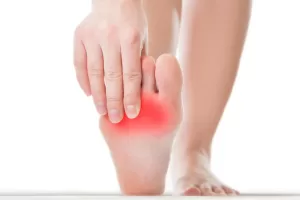 If you’re unsure if you may need to see a podiatrist we’ve created this blog post explaining the role of a podiatrist in foot health – and how this can enhance your overall well-being.
If you’re unsure if you may need to see a podiatrist we’ve created this blog post explaining the role of a podiatrist in foot health – and how this can enhance your overall well-being.
What is a podiatrist?
Podiatrists are university-trained health professionals who specialise in the assessment, diagnosis, prevention and treatment of conditions affecting the feet and lower limb. Simply, they are foot health experts.
Why do people see a podiatrist?
Your feet contain a quarter of the bones in your entire body, twenty-six plus two sesamoid bones in each foot to be exact. For pain-free movement to occur, a complex system of joints, ligaments, tendons and muscles need to function together. Not only do your feet contact the ground but they carry you around for a lifetime!
While the feet can sometimes be overlooked or ignored, if a problem occurs it takes a toll on day-to-day life. Podiatrists understand the structure and movement of the foot and lower limb and conduct biomechanical assessments to identify areas to address. Alternatively, if you have diabetes the podiatrist will check your circulation and test the protective sensation in your feet. Once an overall picture is obtained a podiatrist will advise on an appropriate treatment plan.
Often a foot problem will have multiple contributing factors. For example, foot structure, age, shoe choices or physical demands of your job to name a few. This is why your podiatrist will utilise a number of treatment approaches combined to form a management plan. If you are experiencing foot pain or tired and aching legs, your podiatrist may give you footwear advice, recommend specific stretching or strengthening exercises, strapping application or orthotic devices – to give you an idea of a few possible treatment options. Whilst, if you have a painful corn or ingrown toenail tools will be used to remove the offending ailment and preventative measures discussed.
When should you see a podiatrist?
General podiatry
-
General nail care – hard/thick toenails, difficulty reaching your feet or poor eyesight
-
Ingrown toenails, discoloured toenails
-
Fungal nail infections
-
Callus, corns and cracked heels
-
Plantar warts
Foot pain
-
Tired & Aching feet or legs
-
Assessment for orthotics
-
Heel & Arch pain (plantar fasciitis)
-
Forefoot pain (Morton’s neuroma)
-
Foot arthritis
-
Bunions
Diabetic foot care
-
Circulation & nerve testing
-
Diabetic foot education (preventing diabetic foot complications)
-
Footwear advice
-
Wound care
-
Diabetic insoles
Paediatric Podiatry (Kids feet)
-
Flat feet
-
Growing pains
-
Heel pain (Severs)
-
In-toeing (pigeon toed)
-
Toe walking
-
Lower limb coordination issues
-
Sport injuries
Do I need a referral?
You do not need a referral from a GP to see a podiatrist. However, in certain circumstances you may be eligible for a Team Care Agreement (TCA) allowing your GP to refer you under a Chronic Disease Management (formerly Enhanced Primary Care) item. This will allow you to claim a Medicare rebate on a certain number of podiatry visits. Patients covered by Department of Veteran’s Affairs will require a GP referral.
If you have a private health fund it is a good idea to check if you are covered for podiatry care before your appointment – item code F004 for an initial consultation.
To schedule an appointment at Armidale Podiatry phone 02 6771 9142 or book an appointment online(NEEDS LINK)
